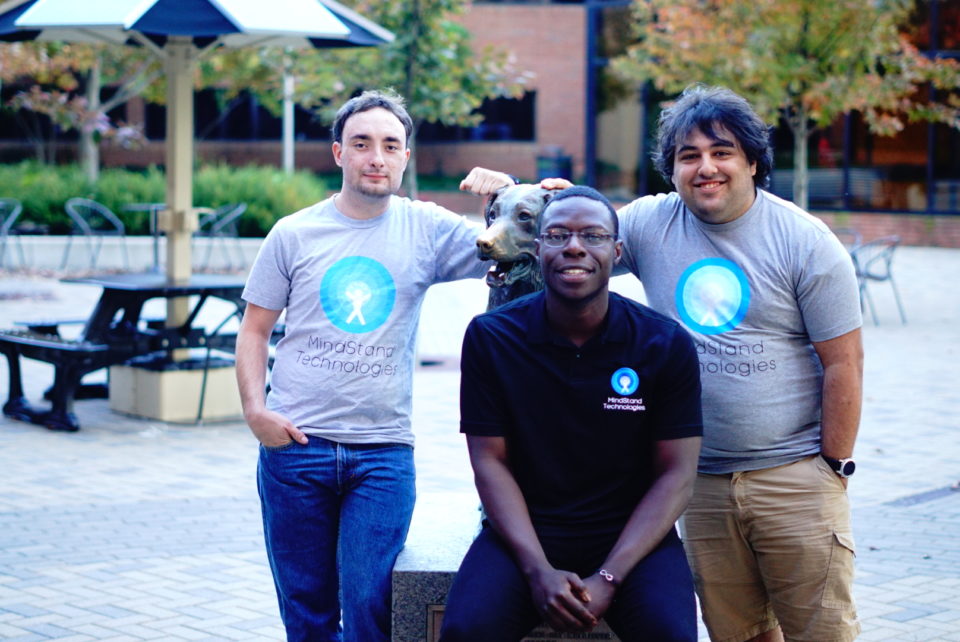Where are you based?
Typically, it’s an easy question, even as we at Technical.ly often clarify that we like to get specific about what neighborhood, rather than which city.
But in these times of pandemic-caused remote work, it’s one that has confounded many an interview subject. If you spent most time at home, should you say your home address? Your office or coworking space? Delaware?
With things being disjointed, it might beg a more existential question: What is the Baltimore tech community right now? We’re still getting together, but it’s on Zoom — the same place everyone else is gathering. What does that mean for the future of a local economy?
In thinking about it for a minute, though, it doesn’t take long to realize that an active community is still making plenty of things happen. Accelerators are still gathering cohorts, investors are still funding, and there are shared spaces still up and running. Most of all, companies are still building and signing clients. They’re putting forward business models during this time that will shape us going forward.
That’s why it’s important to keep taking a look at what ventures are worth watching. For anyone building or supporting a startup, we think it’s always useful to get an idea of what else is out there, and who might become an economic contributor. So, when there are fewer common spaces to see each other, maybe it can help even more.
It’s in that spirit that we bring you 2021’s RealLIST Startups, our look at the up-and-coming tech companies to know.
This year, RealLIST Startups returns for its fifth year. That means, with this edition, we’ve added nearly 100 companies to the must-watch list. Plenty have pivoted. Some have gone on to become growth companies, some have exited, others haven’t made it. Such is the nature of startups. Take a look at 2020, 2019, 2018 and 2017.
As for the series itself, we’ve found reason to expand with RealLISTs of engineers and connectors, but the list of promising young companies remains the way we kick off the calendar year. Startups, we believe, are a prime measure of where the tech community is going next.
First, a word about how we go about selecting the companies. While there’s plenty to weigh, we do have some common criteria. To be considered, startups must:
- Be no more than three years old — That sunset period stems from Technical.ly cofounder Christopher Wink’s 2012 definition of a startup. This restriction took away lots of members of last year’s list, as well as companies that have successfully moved out of that early stage where they’re figuring out their business model. We had to draw the line somewhere.
- Make the majority of their revenue from a product — That means agencies were not eligible.
- Have not exited or undergone an acquisition, IPO or something close to that nature
As we’re considering companies, we look at indicators of growth, such as funding, early client traction, office space and work to establish a repeatable model. We have a preference for companies that chose the big idea, and we look at the tenacity and track records of the founders and teams.
So, let’s get to it: Baltimore’s RealLIST Startups 2021. These are the companies we consider most promising, and we’ll be tracking them with some added interest all year.
(One important caveat about this list: Not making this list does not mean we deem a startup “unreal.” This is simply a snapshot of what we’re most excited about right now.)

10. Parity
We first saw Bree Jones present the equitable development company when GiveBackHack came to Baltimore in 2019. She spoke of the company as a response to displacement that happens when new development comes to Black communities. She has built a model to acquire and rehab homes by the block, and giving residents a voice in new development. In the last year, Parity won $25,000 at Johns Hopkins University Social Innovation Lab, and received one of the first investments from Innovation Works’ Ignite Capital. In a city that has struggled to solve its vacant housing problem and has seen Black homeownership drop dramatically, new models are welcome, and Jones is growing one.
9. Trustate

In covering entrepreneurship, the stories stand out alongside the companies. When Trustate launched earlier in 2020, CEO Leah Del Percio told us about how she quit her job as a corporate lawyer to start a company. The startup brings tech to a process she worked with many families on: settling an estate after the death of a loved ones. It has a compelling product, and there’s market opportunity in a space that doesn’t have tech. Tara Faquir joined as COO, she and Del Percio talked about how staying in touch after college led them to become cofounders. Now the team is set to continue growing. The product has both a tech and human side. We’ve found that to be true of the company, as well.
8. Infinite Focus Schools

Baltimore has a long history in edtech, but Ashley Williams’ company takes a particular focus on the social and emotional well-being of students, taking on the “toxic stress” that can overshadow learning. Progressing through accelerators like JHU Social Innovation Lab and Loyola University Maryland’s Baltipreneneurs, Williams built a platform that’s designed not to add too much to teachers’ already full plate, with the right-size content for learners: quick video and data tools that allow teachers to press play. Williams is another funding recipient from Ignite Capital, giving room to grow in the market.
7. MindStand Technologies

While attending UMBC, the company’s three cofounders set out to apply AI to the work of rooting out harassment, hate speech and emotional distress in online communities — a culture gap that has only become more pressing in a tumultuous 2020 and increasingly digital shift of the pandemic. It is building and developing the tool for universities and enterprises, and has grown to a team of 11 people. Quickly gaining local attention, MindStand earned an honorable mention last year. It has since gone on to take part in national accelerators such as the Envision Accelerator, building a voice for inclusive tech from Baltimore.
6. Rose Health

The pandemic has brought many side effects for society, and mental health being is among those taking a particular toll. For healthcare, it brought a need to reach patients who can’t visit the office, bringing new energy around digital tools. Mount Washington-based Rose sits right in the middle of both trends, with digital therapy tools for mental health care including a patient monitoring app and provider dashboard. CEO Kavi Misri founded the startup after his own experience with mental health services left him want to bring efficiency to the system, and was already on our radar after participating in accelerators like JHU Social Innovation Lab and Halcyon House. It grew the team and client base in 2020 and is set up to continue. Rose recently closed a $1.73 million seed round, which was oversubscribed, drawing support from lead investor Old Line Capital Partners and former Ravens star Torrey Smith.
5. Protaryx Medical

At this point, medical devices are a firmly entrenched startup strength for Baltimore. There was always scientific muscle coming out of institutions like University of Maryland, Baltimore and Johns Hopkins, and in the last few years the universities have thrown resources behind commercializing those inventions. Recently, we’ve seen startups get products to market and exit to leaders in the field. One effect of that is a growing number of executives with experience to lead new companies. The progression is apparent with Protaryx Medical, which was founded by two of the key innovators behind Harpoon Medical and its 2017 acquisition by Edwards Life Sciences — University of Maryland School of Medicine Chief of Cardiac Surgery Dr. James S. Gammie, and CEO Terri Burke. With support from the university’s UM Ventures, the company made progress on its device for beating heart cardiology procedures, which is designed to reimagine access to the left heart, and raised $8.3 million. It’s among a new generation of companies in the city bringing new technology to decades-old medical procedures.
4. MissionGo

A 2019 drone flight that delivered a kidney across Baltimore to the University of Maryland Medical Center was the kind of tech milestone that drew international attention, and a Technical.ly award. Beneath the headlines, there was a collaboration between a host of local leaders from the University of Maryland, medical, innovation and flight community working on changing how donated organs are transported ahead of transplant. That work has now resulted in MissionGo, a Canton-based startup that brought another milestone with a flight in Nevada this year. It also has a sister company called MediGo, which is working on the logistics portion of transporting human organs. We’ve seen drones used in lots of ways over the last decade, but when it comes to helping humanity, medical transport of life-saving organs rises to the top. A third company based at the same location, called AlarisPro, provides software for fleet management and maintenance of unmanned systems. It all points to a UAS hub developing on Baltimore’s waterfront.
3. Live Chair Health

Throughout interviews for a profile of Live Chair we reported in the fall, there was a common theme on the topic of bringing systems change: Meet people where they are. It’s that approach that led founder Andrew Suggs and his team to develop a model that brings digital health tools to barbershops in Black communities. The company moved to Maryland and participated in the FounderTrac accelerator. It saw growth in 2020 with a partnership with LifeBridge Health to expand in Baltimore. For Suggs, it’s not just a matter of technology, but also building relationships in the community and ultimately addressing health disparities that put Black men at risk.
2. Delfi Diagnostics
Founded in 2019, Delfi Diagnostics is developing a blood test for early detection of cancer. The company has an approach to “liquid biopsy,” which is an emerging type of test that allows doctors to look for cancerous cells from a blood sample rather than a surgically taken tissue sample. Others are working in this area of development, but Delfi’s version is founded by noted Johns Hopkins oncology and genomics professor (and now-two-time founder) Dr. Victor Velculescu, showing how Baltimore’s top-tier medical research can lead to startups based in the city. The company is set for growth after raising $100 million in venture funding. That’ll help build out a team based in JHU’s Remington space and continue development to bring it to market.
1. Tradeswell

We cover lots of leadership moves and this company had one of the most notable of 2020: Six years after departing pioneering mobile advertising company Millennial Media, Paul Palmieri returned to the CEO role of a Baltimore startup in 2020. At Tradeswell, he leads a team bringing experience from several of the city’s noted companies. Its software product focuses in ecommerce, an area that was seeing growth, even before the pandemic’s digital shift. It’s off to a fast start. The company has raised nearly $19 million in capital reported raised in less than a year, and said it had 150 brands on the platform since launching in October. It’s a market with lots of different players, where change is constant. Palmieri has talked about how Tradeswell is aiming to address what he calls the broken economics of ecommerce by applying a “software brain.” It’s the same kind of opportunity he saw with Millennial Media.
###
Runners up:
- MethodData — Founded at the beginning of 2020 by Sebastian Walker, the startup set out to create tools for easier sales reporting in HubSpot and build in Baltimore. A 50-company listening tour led to early traction, as it created reports and dashboards.
- Relavo — We first saw this team of Johns Hopkins students pitch its medical device for safe at-home dialysis at a university demo day, and pull in funding. Since then it has made a mark beyond Baltimore, including the $500,000 KidneyX Prize in 2020 and participation in a pair of global accelerators.
- Dentuit Imaging — The startup building AI tools for dental X-rays shows a path from a local university to local the tech community: CEO Dan Lee got early support from student-focused resources while studying computer science at UMBC. In 2020, a federal Small Business Technology Transfer grant helped propel it forward at a time when the need for remote healthcare became apparent.
- Mastermnd — A longtime tech instructor, Aaron Brooks went took his offerings digital in 2019, with an online tech bootcamp through Twitch. By October 2020, he went full-time with the company and a big aim to scale opportunity.
- Black Brain Trust — To close out the latest cohort of ETC’s Accelerate Baltimore, cofounder Angel St. Jean laid out how companies have a role in creating equity, but need to be held accountable. The startup’s tool, called the equity in action score, puts data behind that push.
- Lockbox Adventures — Ben Ferry’s “escape room in a box” took off on Reddit’s Secret Santa Gift Exchange, and in-person at bars. So Ferry decided to turn it into a full-blown company. After going through the Towson University’s StarTUp Accelerator, he’s looking to move forward in the area of company culture.
- Bloom Box — Among a group of consumer-facing companies coming out of the University of Baltimore, Bloom Box reached launch for its subscription service for growing microgreens in late 2020. Founder Kevin McHugh has a big vision to make gardening accessible in even small apartments, but has shown a willingness to make the small changes necessary to get to this point.
- ACTIVECharge — If clean energy is to truly take off, it will need the kinds of tools that bring efficiency at industrial scale. This UMBC company has one such offering: monitoring technology for wind turbines. Keeping with the clean energy mission, the sensor and data transmitter is self-powered. With support so far from Exelon, the Maryland Energy Innovation Accelerator and the F3 Tech Accelerator it is catching a gust of momentum.
- SpreadKarma — Wide use of crowdfunding platforms has left room for new models to emerge, and this startup’s approach focuses in social giving. The team is seeking not to just to offer a way to raise funds, but also to provide support to the changemakers raising them. And it vets all of the orgs who sign up. Currently in the JHU Social Innovation Lab cohort, it has a focus on underserved communities.
- Flave — The app was created by JHU and Towson University-connected faculty and students to gamify dining and boost local restaurant sales found its use speaking to the times as the pandemic restrictions meant restaurants were in need of a boost. As cofounder Jal Irani pointed out to us, it also offers a way for technology to support restaurants without taking a fee, like the delivery apps that are currently facing pressure from the city. Participation in Towson University’s StarTUp accelerator helped the startup move forward.







